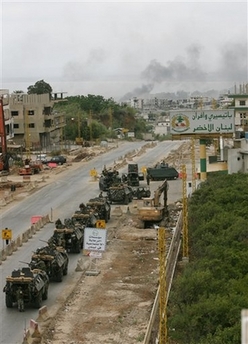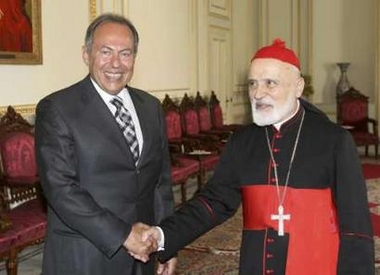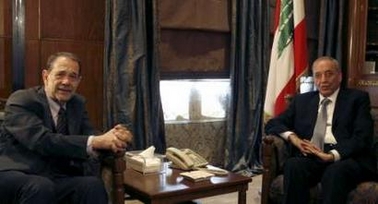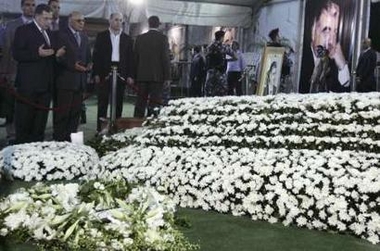It was unclear from reports on the ground whether the army had penetrated deep into the camp, or limited its advance to outer neighborhoods that militants had used to direct sniper fire at army positions. Nahr el-Bared, like the other 11 Palestinian camps in Lebanon, has been off limits to Lebanese authorities under a nearly 40-year-old agreement that stipulated Palestinians would run their own affairs. Two soldiers were slightly wounded in Friday's fighting, according to officials at a local hospital.About 50 armored carriers, battle tanks and military vehicles from elite units massed at the northern edge of the camp and drove toward the forward-most positions, according to an AP Television News crew at the scene. There was no confirmation that army units were making a final push to take over the camp or were just advancing to grab territory and isolate the militants. But a significant decrease in shelling accompanied by a rise in machine gun fire from armored carriers and exchanges of automatic rifle fire suggested the troops were already engaging the militants. By BASSEM MROUE, Associated Press Writer, TRIPOLI, Lebanon June 1 - 2007- Under the cover of artillery barrages, dozens of Lebanese army tanks and armored carriers moved toward a Palestinian refugee camp in northern Lebanon Friday in pursuit of Islamic militants holed up inside. The artillery bombardment sent white clouds rising above the Nahr el-Bared camp, where Fatah Islam militants have been hanging on in a 13-day siege by the Lebanese army. The shelling also ignited fires in the camp that spewed black smoke. The militants have barricaded themselves in residential neighborhoods of narrow, winding streets and apartment buildings.
By BASSEM MROUE, Associated Press Writer, TRIPOLI, Lebanon June 1 - 2007- Under the cover of artillery barrages, dozens of Lebanese army tanks and armored carriers moved toward a Palestinian refugee camp in northern Lebanon Friday in pursuit of Islamic militants holed up inside. The artillery bombardment sent white clouds rising above the Nahr el-Bared camp, where Fatah Islam militants have been hanging on in a 13-day siege by the Lebanese army. The shelling also ignited fires in the camp that spewed black smoke. The militants have barricaded themselves in residential neighborhoods of narrow, winding streets and apartment buildings.
 BEIRUT daily - star : President Emile Lahoud said Tuesday that he would step down as president in a matter of months and suggested the formation of a six-minister "national salvation government" to carry the country out of its prolonged political deadlock. Lahoud spoke after a lunch meeting with Maronite Patriarch Nasrallah Boutros Sfeir in Bkirki. In a meeting between the leaders described afterward by both as positive, talks centered on the narrowing window of opportunity for the country's two main political camps to come together ahead of presidential elections scheduled for late September.
BEIRUT daily - star : President Emile Lahoud said Tuesday that he would step down as president in a matter of months and suggested the formation of a six-minister "national salvation government" to carry the country out of its prolonged political deadlock. Lahoud spoke after a lunch meeting with Maronite Patriarch Nasrallah Boutros Sfeir in Bkirki. In a meeting between the leaders described afterward by both as positive, talks centered on the narrowing window of opportunity for the country's two main political camps to come together ahead of presidential elections scheduled for late September.
After Lahoud repeated to Sfeir the opposition's proposal for a national unity government, the patriarch said he feared that an enlarged government would give way to more political infighting. Lahoud then suggested a six-minister "national salvation Cabinet" to comprise ministers representing the country's six major sects. Speaking to reporters after his meeting with Sfeir, Lahoud said that time was short to reach a solution to the political crisis.
"The solution, as I have said before, and I am sure His Beatitude agrees, is for the Lebanese to sit together as soon as possible and for a national unity government to be established and for the [opposition] sit-in to end, in order to resolve all thorny issues, starting with the issue of the camp," he said, referring to the 10-day standoff between the army and Islamist militants in Nahr al-Bared. Lahoud said such steps were needed to ensure a "good summer season" and that presidential elections are held on time.
 BEIRUT (Reuters) - Lebanon's parliament speaker said on Thursday the UN security council had ignored the country's constitution in voting to set up a tribunal for suspects in the killing of former Lebanese Prime Minister Rafik al-Hariri. Parliament Speaker Nabih Berri said the Security Council had also ignored a need for Lebanese consensus on the court, which the Council on Wednesday voted to set up in a move forecast to cause more instability in Lebanon.
BEIRUT (Reuters) - Lebanon's parliament speaker said on Thursday the UN security council had ignored the country's constitution in voting to set up a tribunal for suspects in the killing of former Lebanese Prime Minister Rafik al-Hariri. Parliament Speaker Nabih Berri said the Security Council had also ignored a need for Lebanese consensus on the court, which the Council on Wednesday voted to set up in a move forecast to cause more instability in Lebanon.
You have picked internationalization instead of the state," Berri, a leading member of the opposition, said in a brief statement.Berri had refused to call parliament to vote on U.N. plans for the court because he contests the legitimacy of the Beirut government.
The governing coalition, including Saad al-Hariri, son and political heir of the former premier, had made establishment of the tribunal a priority and welcomed the Security Council vote as a victory for Lebanon.
Khazen History


Historical Feature:
Churches and Monasteries of the Khazen family

St. Anthony of Padua Church in Ballouneh
Mar Abda Church in Bakaatit Kanaan
Saint Michael Church in Bkaatouta
Saint Therese Church in Qolayaat
Saint Simeon Stylites (مار سمعان العامودي) Church In Ajaltoun
Virgin Mary Church (سيدة المعونات) in Sheilé
Assumption of Mary Church in Ballouneh
1 - The sword of the Maronite Prince
2 - LES KHAZEN CONSULS DE FRANCE
3 - LES MARONITES & LES KHAZEN
4 - LES MAAN & LES KHAZEN
5 - ORIGINE DE LA FAMILLE
Population Movements to Keserwan - The Khazens and The Maans
ما جاء عن الثورة في المقاطعة الكسروانية
ثورة أهالي كسروان على المشايخ الخوازنة وأسبابها
Origins of the "Prince of Maronite" Title
Growing diversity: the Khazin sheiks and the clergy in the first decades of the 18th century
Historical Members:
Barbar Beik El Khazen [English]
Patriach Toubia Kaiss El Khazen(Biography & Life Part1 Part2) (Arabic)
Patriach Youssef Dargham El Khazen (Cont'd)
Cheikh Bishara Jafal El Khazen
Patriarch Youssef Raji El Khazen
The Martyrs Cheikh Philippe & Cheikh Farid El Khazen
Cheikh Nawfal El Khazen (Consul De France)
Cheikh Hossun El Khazen (Consul De France)
Cheikh Abou-Nawfal El Khazen (Consul De France)
Cheikh Francis Abee Nader & his son Yousef
Cheikh Abou-Kanso El Khazen (Consul De France)
Cheikh Abou Nader El Khazen
Cheikh Chafic El Khazen
Cheikh Keserwan El Khazen
Cheikh Serhal El Khazen [English]
Cheikh Rafiq El Khazen [English]
Cheikh Hanna El Khazen
Cheikha Arzi El Khazen
Marie El Khazen
 Beirut
Beirut